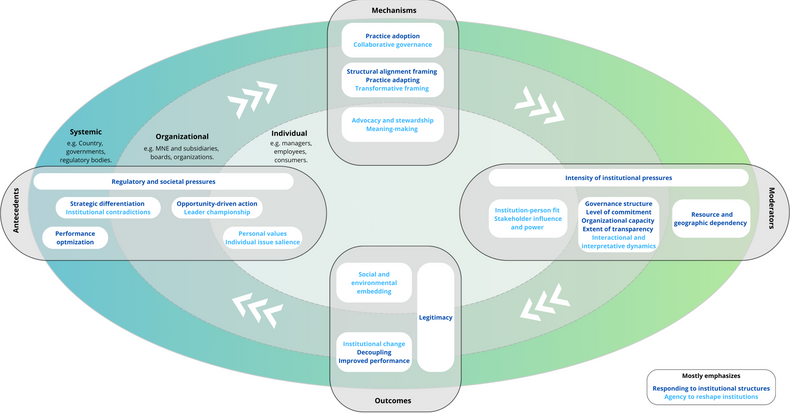Tags:
In this insightful piece, Lucas Amaral, Associate Professor at IÉSEG School of Management, delves into the critical topic of building ethical systems and how they are shaped across three levels: individual, organisational and systemic. IÉSEG was also a proud National Partner of our recent Ethics at Work survey.
Businesses today face growing pressures to act ethically and sustainably. But despite increased attention by organisations to ESG, responsible leadership, and purpose-driven strategies, many well-intentioned efforts still fall short when contrasted to their initial intentions. Why?
One reason is that organisations often treat ethics as an internal matter, something to be addressed through the adoption or adaptation of practices, such as codes of conduct and ethical standards. But our research suggests ethics is never just an internal issue. It shapes and is shaped by broader institutional forces across three levels: individual, such as employees, leaders and managers; organisational, i.e. at the company level, and systemic, such as industries, and governments.
In our recent review published at the Journal of Management (Galleli & Amaral, 2025), we analysed 720 studies that use institutional theory to examine what we call social and environmental efforts in management – an umbrella term that includes sustainability, CSR (Corporate Social Responsibility) and ESG initiatives within and across organisations. While ethics was not our sole focus, it is inherently woven into these efforts, influencing how organisations define responsibilities, make decisions, and confront tensions in pursuing social and environmental goals.

We developed a multi-level model that maps how different actors respond to institutional pressures. For example, organisations may produce sustainability reports to align their practices with external expectations, or managers might become responsible for monitoring new social and environmental indicators. But we also show how these actors actively work to reshape institutions, such as by creating new social and environmental norms. This dynamic – between shaping and being shaped by institutions – unfolds across levels and carries real implications for building ethical business systems.
For instance, at the systemic level, public institutions shape business expectations through regulation, norms, and incentives. The UK’s Financial Reporting Council’s ESG standards provide guidance to firms and exert pressure for them to align their practices with their frameworks, operating on a “comply or explain” basis. Likewise, when country leaders decide to weaken sustainability agendas, like it is currently the case in the US, this also creates pressure for organisations to conform with such a systemic pressure.
At the organisational level, companies might create ethics policies, publish sustainability reports, or join voluntary initiatives, but may also resist or comply only with superficial actions. Other entities, such as social movements and non-profits, can act as intermediary actors that monitor these systemic pressures and how much businesses align with them.
At the individual level, employees and managers interpret, enact, or resist social and environmental efforts in their everyday decisions, especially when values conflict or when managerial and societal support is lacking.
This dynamic is continuous, as the actions and reactions happening at each of these levels have impacts on other levels. For instance, as organisations give space for employees and managers to engage in specific initiatives that they consider ethical, their excitement or resistance might shift organisations’ trajectories, propelling them to become bolder or less active in their initiatives, as they are shaped by actors involved. As organisations align or go against systemic pressures, they might also influence their industries, and even push for specific legislative changes, be it to relax or strengthen ethical aspects.
Why does this matter for business?
Ethical business leaders face a number of common challenges, and understanding the interplay between the three levels of institutional forces can guide their strategies:
- It is important to have consistency between words and actions, and this needs to take place across levels. A company might commit to social causes while belonging to industry groups that lobby against climate regulation. Employees and leaders, as well as external audiences, such as consumers and social movements, are increasingly pressuring for simultaneous discursive and behavioural consistency across topics.
- Ethics is not just about culture; it is institutional. Business ethics depends not only on a strong internal culture but also on how firms engage with broader systems. Responsible lobbying, transparent advocacy, and engagement with public institutions all shape how organisations are perceived by different audiences over time.
- Individuals can make or break ethical systems. Despite the rise of "ethical leadership" as a key business issue, we found that individual-level dynamics remain understudied. Ultimately, individual values are behind every firm, NGO, or government.
Ethics does not live in a report or a training module. It lives in the interactions between individuals, the structure of institutions, and the coherence of organisational action over time, meaning their culture. Ethics should not be viewed as another compliance task, but as a multi-level system, one that must be continuously aligned and actively maintained.
Author

Lucas Amaral
Associate Professor, IÉSEG School of Management, France
Lucas Amaral is an Associate Professor at IÉSEG School of Management, France. His research is situated in the intersection between the strategy implementation of social and environmental initiatives and employees’ evaluations. Lucas holds a PhD from King’s College London, and his qualitative research has been featured in top management outlets.
